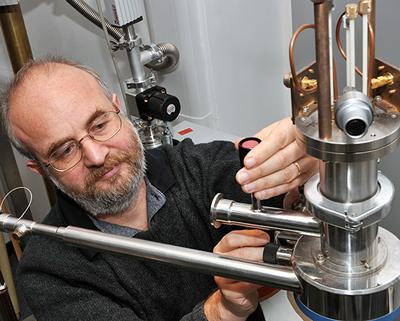Southampton professor to advance nuclear magnetic resonance expertise in Indian visiting fellowship

Professor Malcolm Levitt from the University of Southampton has been awarded a prestigious visiting fellowship from the Royal Society to exchange scientific expertise with three institutes in India.
The physical chemist will take part in international visits to Hyderabad, Bangalore and Cochin as one of five senior UK academics honoured this winter in the Royal Society Yusuf Hamied Programme.
The fellowship will build upon Malcolm’s longstanding links with India to develop new connections between research teams and deliver courses and seminars that could help stimulate future collaborations with Indian scientists.
Malcolm is a leading expert in nuclear magnetic resonance (NMR), which is more broadly known to the public in the form of magnetic resonance imaging (MRI) used in medical scanners.
He plans to use the visiting fellowship to learn more about optical atomic magnetometry, which uses lasers to read the very tiny magnetic fields generated by atomic nuclei.
“Competition for these awards is intense so I am very happy that my project was viewed favourably by the awards committee,” Malcolm says. “I’m also very grateful for the support from the School of Chemistry in applying for this, including an agreement to relieve me from teaching duties for the award period.”
Malcolm will spend around six weeks at the Tata Institute for Fundamental Research (TIFR) in Hyderabad, based within the institute’s Centre for Interdisciplinary Science.
The institute spans a wide range of disciplines from fundamental physics, through soft matter physics, chemistry, biochemistry, and molecular biology. Malcolm will take particular interest in working with institute scientists on a technique called optical polarisation, which allows the NMR signals of noble gases (3He, 129Xe) to be enhanced by a factor of one million.
His second visit will take place at the Indian Institute of Science in Bangalore, where he will continue pursuing complementary research interests with longstanding peers.
The final stop will take in the Cochin Institute of Science and Technology in Cochin, in the South-West of India, where Malcolm will share teaching and educational activities for physics and chemistry students.
The Royal Society Yusuf Hamied Programme was launched in 2017 through a gift from the Yusuf and Farida Hamied Foundation. The programme selects up to five Fellows and Foreign Members of the Royal Society each year to make visits of between three to 12 weeks.